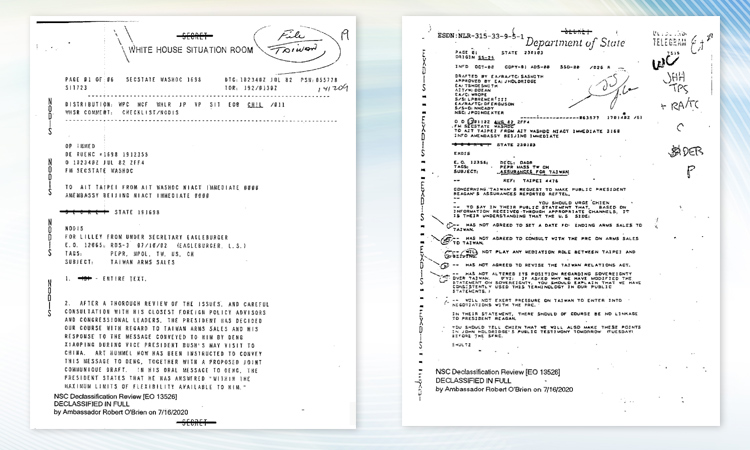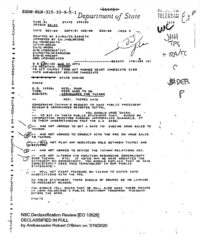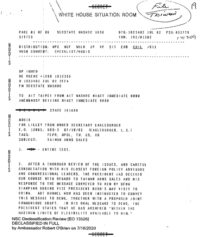
The first declassified cable below, sent on July 10, 1982, from then U.S. Under Secretary of State Lawrence Eagleburger to then AIT Director James Lilley, provides the U.S. interpretation of the 1982 Communiqué as it relates to ongoing U.S. arms sales to Taiwan. The cable explains that the U.S. willingness to reduce its arms sales to Taiwan is conditioned upon the continued commitment of the PRC to a peaceful solution of cross-Strait differences. Further, if the PRC were to become more hostile, then the United States would increase arms sales to Taiwan.
The directive indicates that the United States’ chief concern was maintaining peace across the Taiwan Strait, and thus, the quantity and quality of arms provided to Taiwan would be conditioned entirely on the threat posed by the PRC. The memo ends by offering “this final assurance: U.S. arms sales to Taiwan will continue.”
These same ideas are echoed in an internal presidential memo drafted by President Ronald Reagan on August 17, 1982, which serves as guidelines for U.S. interpretation of the 1982 Communiqué.
The second cable, sent on August 17, 1982, from then U.S. Secretary of State George Shultz to then AIT Director Lilley, offers six assurances to Taiwan, reinforcing the message above. The United States:
- Has not agreed to set a date for ending arms sales to Taiwan
- Has not agreed to consult with the PRC on arms sales to Taiwan
- Will not play a mediation role between Taipei and Beijing
- Has not agreed to revise the Taiwan Relations Act
- Has not altered its position regarding sovereignty over Taiwan.
- Will not exert pressure on Taiwan to enter into negotiations with the PRC.
The “Six Assurances” have been a foundational element in U.S. policy towards Taiwan and the PRC.
Taiwan Arms Sales, Date: 1982-07-10 (200235)

Cable: Taiwan Arms Sales
Drafted July 10, 1982
From: Under Secretary of State Lawrence Eagleburger
To: American Institute of Taiwan Director James Lilley
- Entire Text
- After a thorough review of the issues, and careful consultation with his closest foreign policy advisors and congressional leaders, the President has decided our course with regard to Taiwan arms sales and his response to the message conveyed to him by Deng Xiaoping during Vice President Bush’s May visit to China. Art Hummel now has been instructed to convey this message to Deng, together with a proposed joint communique draft. In his oral message to Deng, the President states that he has answered “within the maximum limits of flexibility available to him.”
- The approach approved by the President does not go significantly beyond our past positions and does not meet Deng’s request for a commitment to end arms sales within a certain period of time. It reaffirms, however, that:
— Arms sales to Taiwan would not exceed, either in qualitative or in quantitative terms, the level of those supplied in recent years since normalization, and that
— The U.S. expects a gradual reduction in its arms sales, over a period of time, leading ultimately to a final resolution to this issue.
- Both positions are premised on a continuation of the Chinese policy of seeking a peaceful resolution of the Taiwan issue. As indicated above, we are not agreeing either to a final date or to an affirmation of an ultimate objective for ending arms sales to Taiwan.
- You are instructed to arrange a meeting with President Chiang as soon as possible, and convey to him our intention to hold the military review conference, notify congress on the F-5E, and transfer the F-104Gs. In addition, you are to provide Chiang with the main elements of the position we are conveying to the PRC.
- Talking points for meeting with President Chiang:
— Under Authorization from President Reagan, I would like to inform you of the following three concrete actions we are taking on the subject of U.S. arms sales to Taiwan:
- A) We are prepared to host at AIT Washington a military review conference at a mutually convenient time. As part of our review of Taiwan’s future defense needs, we will review all items from last August’s package to ensure that they remain fully consistent with Taiwan’s desires. We envision the conference lasting two-three days.
- B) Before the end of August, the Administration will send to congress formal notification of the extension of the F-5E coproduction line, thus assuring there will be no break in production.
- C) The transfer of the first group of 23 out of a total of 66 F-104Gs, which we will purchase from
West Germany, is scheduled for the end of August.
— We appreciate the concerns caused by recent press speculation regarding the discussions going on in Beijing relating to U.S. arms sales Taiwan. I have been authorized therefore to inform you of the U.S. position recently approved by the President and now being presented to Beijing.
— I must emphasize the extreme sensitivity of everything I have told you and would appreciate your keeping the tightest possible control on its dissemination, as well as your cooperation in keeping press speculation on the substance of our discussions with Beijing to the absolutely lowest level possible.
— Let me begin by stating that we have not agreed to set a date certain for ending arms sales to Taiwan, we have not agreed to prior consultation on arms sales, we have not agreed on any meditation role for the U.S., we have not agreed to revise the Taiwan Relations Act, and we have not agreed to take any position regarding sovereignty over Taiwan. The PRC has demanded that we agree to terminate all arms sales to Taiwan “within a certain period of time” (TSAI I Ting Te Shih Ch’I I Nei”). This is not acceptable to us. The PRC has at no time urged us to put pressure on Taiwan to negotiate with the PRC. However, we can assure you that we will never do so. We believe this is a Chinese problem for the Chinese on both sides to decide by their own free choice, and we have made this clear to Beijing both publicly and privately. Our only concern is that the resolution of the matter be peaceful.
–We have offered to state that U.S. arms sales to Taiwan will not exceed, either in qualitative or quantitative terms, the level of those supplied in recent years since the establishment of diplomatic relations between the U.S. and the PRC. This is premised on a continuation of the PRC policy of seeking a peaceful resolution of the Taiwan issue. It would allow for a higher level of arms sales than has occurred over the past 18 months.
We have also offered to state a U.S. expectation of a gradual reduction in arms sales to Taiwan, over a period of time, leading ultimately to a final resolution of this issue. This position is also based on a continuation of the PRC policy of seeking a peaceful resolution to the Taiwan issue:
— should we reach agreement with Beijing on this basis, we would expect the terms to be made public in the form of a joint of communique.
— While I realize the concern that these positions may cause you, I would emphasize that any agreement we reach with Beijing will be predicated on a continuation of Beijing’s peaceful intentions toward Taiwan. We will not be guided simply by Beijing’s word in this matter. We will continue to monitor carefully, through various intelligence capabilities, Beijing’s military production and deployment. We also will keep you informed, through both periodic and ad hoc Intelligence briefings, about what we learn. Any significant change in PRC actions in the direction of a more hostile stance toward Taiwan will invalidate any understanding we may reach with Beijing regarding our future arms sales to Taiwan.
— The above U.S. positions stop well short of the PRC’s demands, and there is a possibility they will be rejected by the authorities in Beijing. In that case, we anticipate that there will be a downgrading of bilateral relations. This will benefit no one and will mean a continuing strain on U.S.-Taiwan relations as well. Therefore, we are making this further effort to reach agreement, while keeping in mind Taiwan’s interests.
— On the other hand, should Beijing agree to these positions and should a joint communique be issued, our benchmark in providing arms for Taiwan will continue to be Taiwan’s genuine defense requirements. There will be no fundamental change in this approach or providing Taiwan the equipment it needs for self-defense in accordance with the provisions of the TRA.
— I hope the above information is helpful to you in understanding the current state of play. I would like to leave you with this final assurance: U.S. arms sales to Taiwan will continue. President Reagan remains deeply concerned about the continued well-being of you, Mr. President, and of your people.
- With regard to the military review conference, you should ascertain at the appropriate level who from the Taiwan side will attend, and what time frame would be convenient for them. We envision the conference being held no earlier than the last week in July, you should emphasize how essential it is that this be conducted under conditions of tightest secrecy.
- If there should be a question regarding the August timing of the F-5E notification to congress, you should point out we are referring to the 36-day formal notification process. This would allow sufficient time for the LOA to be signed before the September 24 deadline. FYI, customary practice is to give congress a 20-day informal notification, and to suspend the formal notification when either house is in recess. We are currently planning to obtain congressional agreement to waive these practices. If for any reason congress is unwilling to go along, the informal notification will have to go to the Hill this month.
Assurances for Taiwan, Date: 1982-08-17 (200235)

Cable: Assurances for Taiwan
Drafted August 17, 1982
From: Secretary of State George Shultz
To: American Institute of Taiwan Director James Lilley
Concerning Taiwan’s request to make public President Reagan’s assurances,
– You should urge Chien
— to say in their public statement that, based on information received through appropriate channels, it is their understanding that the U.S. side:
— Has not agreed to set a date for ending arms sales to Taiwan
— Has not agreed to consult with the PRC on arms sales to Taiwan
— Will not play mediation role between Taipei and Beijing
— Has not agreed to revise the Taiwan Relations Act
— Has not altered its position regarding sovereignty over Taiwan. FYI: If asked why we have modified the statement on sovereignty, you should explain that we have consistently used this terminology in our public statements.
— Will not exert pressure on Taiwan to enter into negotiations with the PRC.
In their statement, there should of course be no linkage to President Reagan.
You should tell Chien that we will also make these points in John Holdridge’s public testimony tomorrow (Tuesday) before the SFRC.
















![Video Thumbnail [Recovered]-01](../../../../wp-content/uploads/sites/269/Video-Thumbnail-Recovered-01-1-750x450.jpg)



